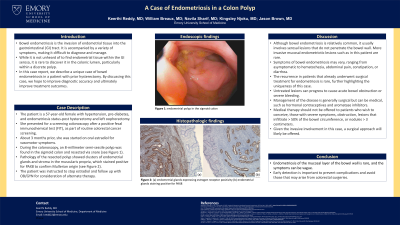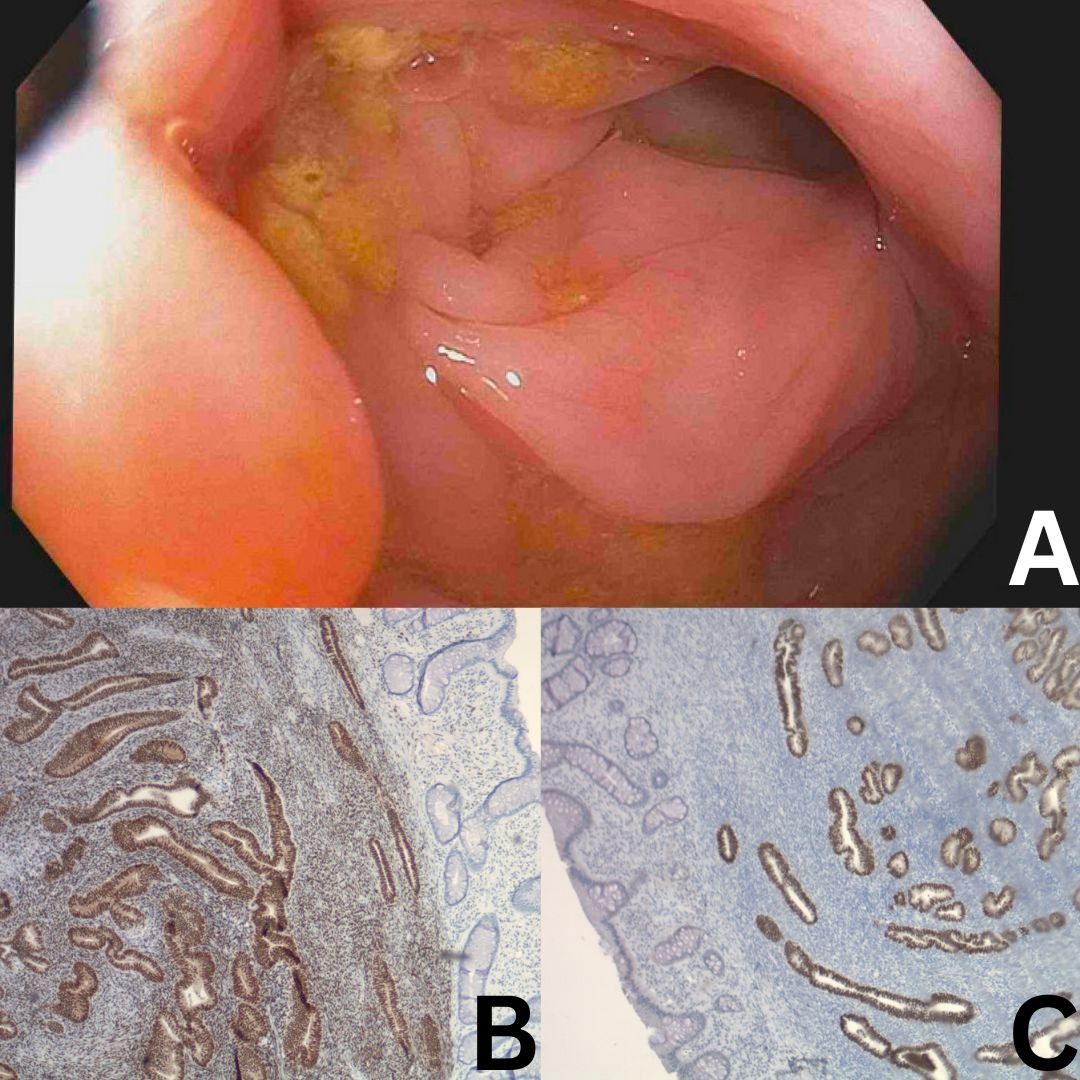Monday Poster Session
Category: Colon
P2000 - A Case of Endometriosis in a Colon Polyp
Monday, October 28, 2024
10:30 AM - 4:00 PM ET
Location: Exhibit Hall E

Has Audio
- KR
Keerthi Reddy, MD
Emory University School of Medicine
Atlanta, GA
Presenting Author(s)
Award: Presidential Poster Award
Keerthi Reddy, MD, William Breaux, MD, Navila Sharif, MD, Kingsley Njoku, MD, Jason Brown, MD
Emory University School of Medicine, Atlanta, GA
Introduction: Bowel endometriosis is the invasion of endometrial tissue into the gastrointestinal (GI) tract. It is accompanied by a variety of symptoms, making it difficult to diagnose and manage. While it is not unheard of to find endometrial tissue within the GI serosa, it is rare to discover it in the colonic lumen, particularly within a discrete polyp. In this case report, we describe a unique case of bowel endometriosis in a patient with prior hysterectomy. By discussing this case, we hope to improve diagnostic accuracy and ultimately improve treatment outcomes.
Case Description/Methods: The patient is a 57-year-old female with hypertension, pre-diabetes, and endometriosis status-post hysterectomy and left oophorectomy. She presented for a screening colonoscopy after a positive fecal immunochemical test (FIT), as part of routine colorectal cancer screening. About 3 months prior, she was started on oral estradiol for vasomotor symptoms. During the colonoscopy, an 8-millimeter semi-sessile polyp was found in the sigmoid colon and resected via snare. Pathology of the resected polyp showed clusters of endometrial glands and stroma in the muscularis propria, which stained positive for PAX8 to confirm Mullerian origin. The patient was instructed to stop estradiol and follow up with OB/GYN for consideration of alternate therapy.
Discussion: Although bowel endometriosis is relatively common, it usually involves serosal lesions that do not penetrate the bowel wall. More invasive mucosal endometriotic lesions such as in this patient are rare. Symptoms of bowel endometriosis may vary, ranging from asymptomatic to hematochezia, abdominal pain, constipation, or diarrhea. The recurrence in patients that already underwent surgical treatment for endometriosis is rare, further highlighting the uniqueness of this case. Untreated lesions can progress to cause acute bowel obstruction or severe bleeding. Management of the disease is generally surgical but can be medical, such as hormonal contraceptives and aromatase inhibitors. Medical therapy should not be offered to patients who wish to conceive, those with severe symptoms, obstruction, lesions that infiltrate > 50% of the bowel circumference, or nodules > 3 centimeters. Given the invasive involvement in this case, a surgical approach will likely be offered. Early detection is important to prevent complications and avoid those that may arise from colorectal surgeries.

Disclosures:
Keerthi Reddy, MD, William Breaux, MD, Navila Sharif, MD, Kingsley Njoku, MD, Jason Brown, MD. P2000 - A Case of Endometriosis in a Colon Polyp, ACG 2024 Annual Scientific Meeting Abstracts. Philadelphia, PA: American College of Gastroenterology.
Keerthi Reddy, MD, William Breaux, MD, Navila Sharif, MD, Kingsley Njoku, MD, Jason Brown, MD
Emory University School of Medicine, Atlanta, GA
Introduction: Bowel endometriosis is the invasion of endometrial tissue into the gastrointestinal (GI) tract. It is accompanied by a variety of symptoms, making it difficult to diagnose and manage. While it is not unheard of to find endometrial tissue within the GI serosa, it is rare to discover it in the colonic lumen, particularly within a discrete polyp. In this case report, we describe a unique case of bowel endometriosis in a patient with prior hysterectomy. By discussing this case, we hope to improve diagnostic accuracy and ultimately improve treatment outcomes.
Case Description/Methods: The patient is a 57-year-old female with hypertension, pre-diabetes, and endometriosis status-post hysterectomy and left oophorectomy. She presented for a screening colonoscopy after a positive fecal immunochemical test (FIT), as part of routine colorectal cancer screening. About 3 months prior, she was started on oral estradiol for vasomotor symptoms. During the colonoscopy, an 8-millimeter semi-sessile polyp was found in the sigmoid colon and resected via snare. Pathology of the resected polyp showed clusters of endometrial glands and stroma in the muscularis propria, which stained positive for PAX8 to confirm Mullerian origin. The patient was instructed to stop estradiol and follow up with OB/GYN for consideration of alternate therapy.
Discussion: Although bowel endometriosis is relatively common, it usually involves serosal lesions that do not penetrate the bowel wall. More invasive mucosal endometriotic lesions such as in this patient are rare. Symptoms of bowel endometriosis may vary, ranging from asymptomatic to hematochezia, abdominal pain, constipation, or diarrhea. The recurrence in patients that already underwent surgical treatment for endometriosis is rare, further highlighting the uniqueness of this case. Untreated lesions can progress to cause acute bowel obstruction or severe bleeding. Management of the disease is generally surgical but can be medical, such as hormonal contraceptives and aromatase inhibitors. Medical therapy should not be offered to patients who wish to conceive, those with severe symptoms, obstruction, lesions that infiltrate > 50% of the bowel circumference, or nodules > 3 centimeters. Given the invasive involvement in this case, a surgical approach will likely be offered. Early detection is important to prevent complications and avoid those that may arise from colorectal surgeries.

Figure: A: endometrial polyp in the sigmoid colon
B: pathology of the polyp showing endometrial glands expressing estrogen receptor positivity
C: pathology of the polyp showing endometrial glands staining positive for PAX8
B: pathology of the polyp showing endometrial glands expressing estrogen receptor positivity
C: pathology of the polyp showing endometrial glands staining positive for PAX8
Disclosures:
Keerthi Reddy indicated no relevant financial relationships.
William Breaux indicated no relevant financial relationships.
Navila Sharif indicated no relevant financial relationships.
Kingsley Njoku indicated no relevant financial relationships.
Jason Brown indicated no relevant financial relationships.
Keerthi Reddy, MD, William Breaux, MD, Navila Sharif, MD, Kingsley Njoku, MD, Jason Brown, MD. P2000 - A Case of Endometriosis in a Colon Polyp, ACG 2024 Annual Scientific Meeting Abstracts. Philadelphia, PA: American College of Gastroenterology.

